An Analysis of Mentor's Role in Clinical Learning and Assessment
VerifiedAdded on 2023/06/10
|9
|2936
|165
Essay
AI Summary
This essay comprehensively explores the pivotal role of mentors in the clinical environment, emphasizing their significance in facilitating student learning and assessment. It highlights how mentors act as thought partners, fostering student empowerment and academic success through continuous interaction, guidance, and support. The essay details the practical aspects of mentorship, including providing student handbooks, promoting effective communication with patients, and setting professional boundaries. It also examines the crucial role of mentors in assessing student performance through constructive feedback and ensuring a safe and inclusive work environment. Furthermore, the essay discusses the application of Nursing and Midwifery Council standards and Maslow's Hierarchy of Needs to enhance the learning experience. The conclusion reinforces the importance of mentors in developing students' skills, building trust, and creating a conducive learning environment, ultimately contributing to their overall development and engagement in patient care.
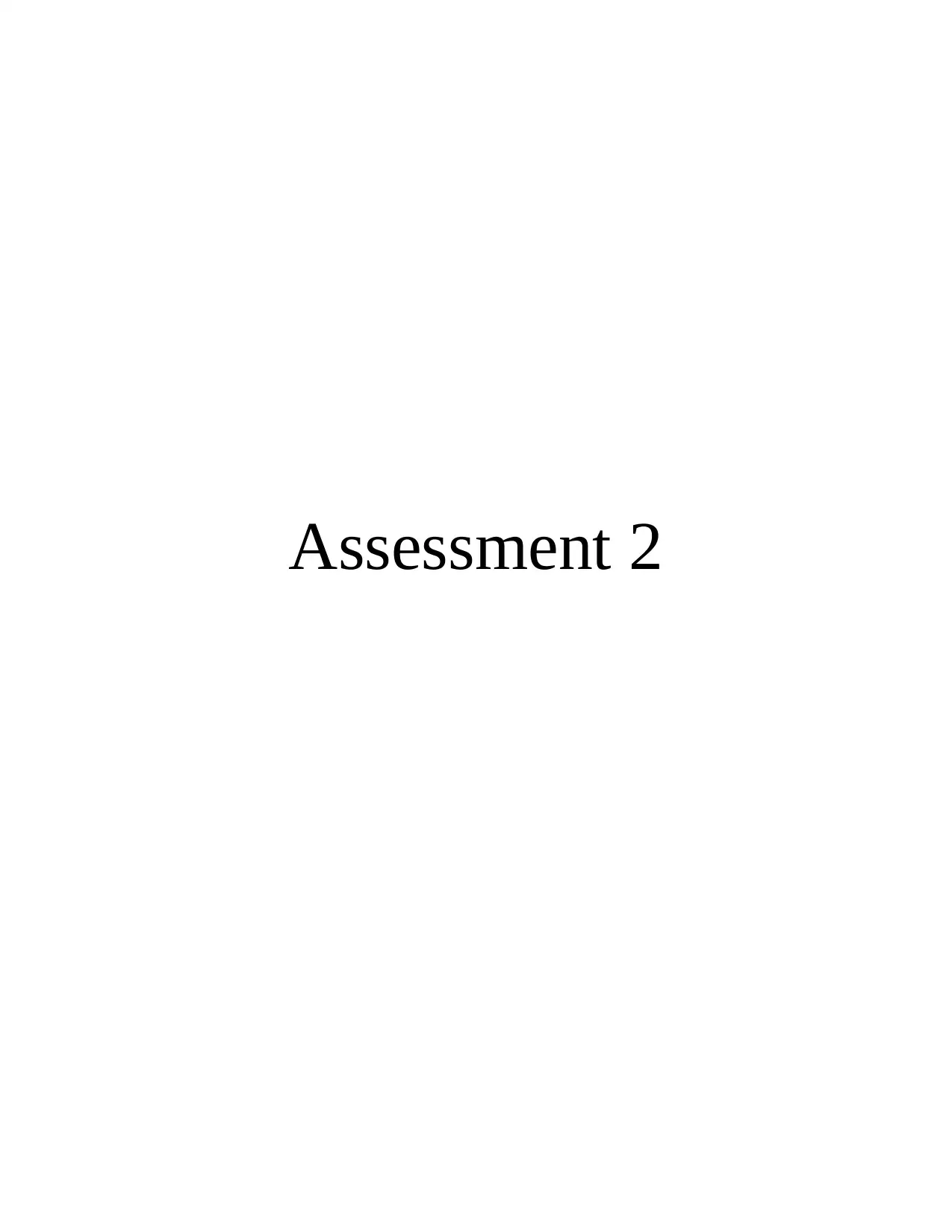
Assessment 2
Paraphrase This Document
Need a fresh take? Get an instant paraphrase of this document with our AI Paraphraser
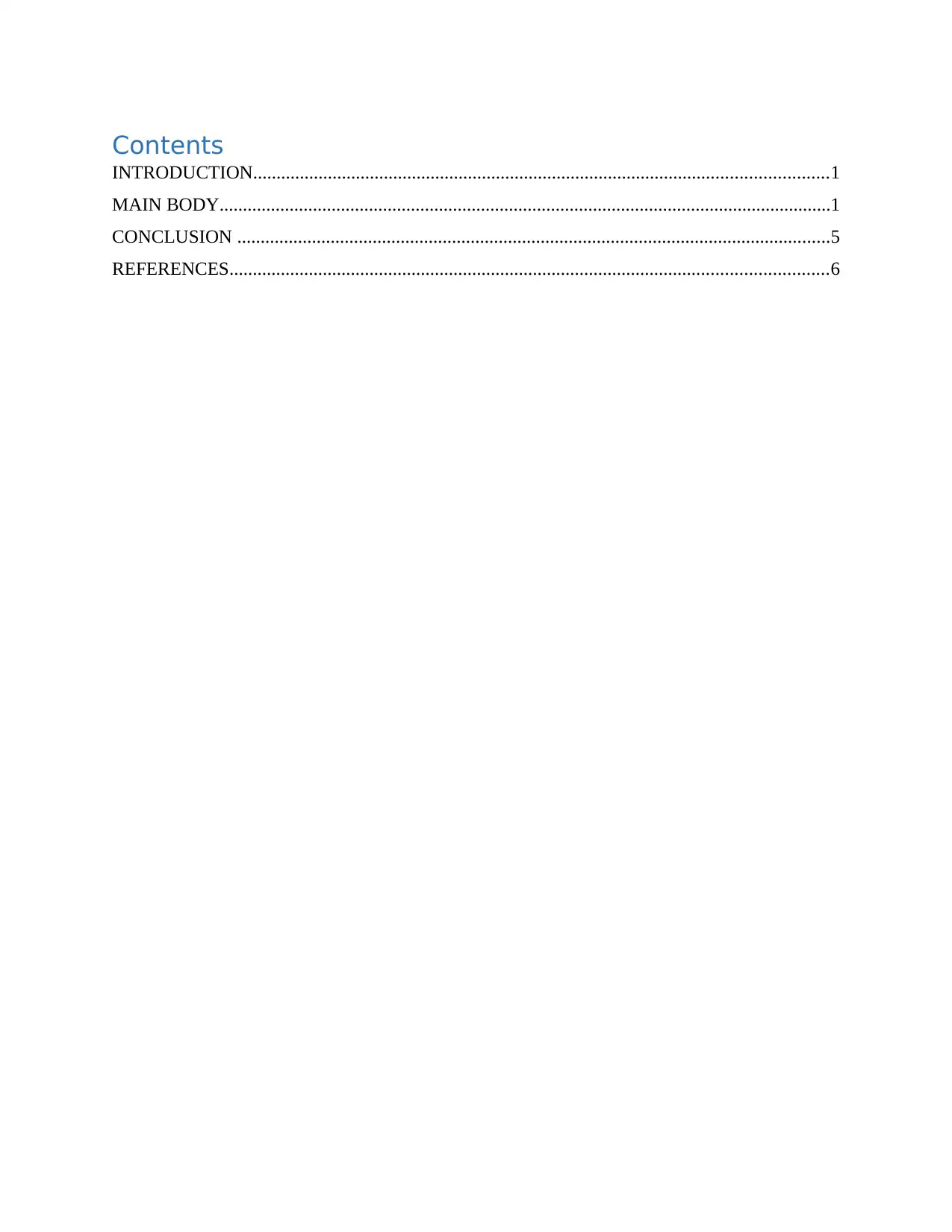
Contents
INTRODUCTION...........................................................................................................................1
MAIN BODY...................................................................................................................................1
CONCLUSION ...............................................................................................................................5
REFERENCES................................................................................................................................6
INTRODUCTION...........................................................................................................................1
MAIN BODY...................................................................................................................................1
CONCLUSION ...............................................................................................................................5
REFERENCES................................................................................................................................6
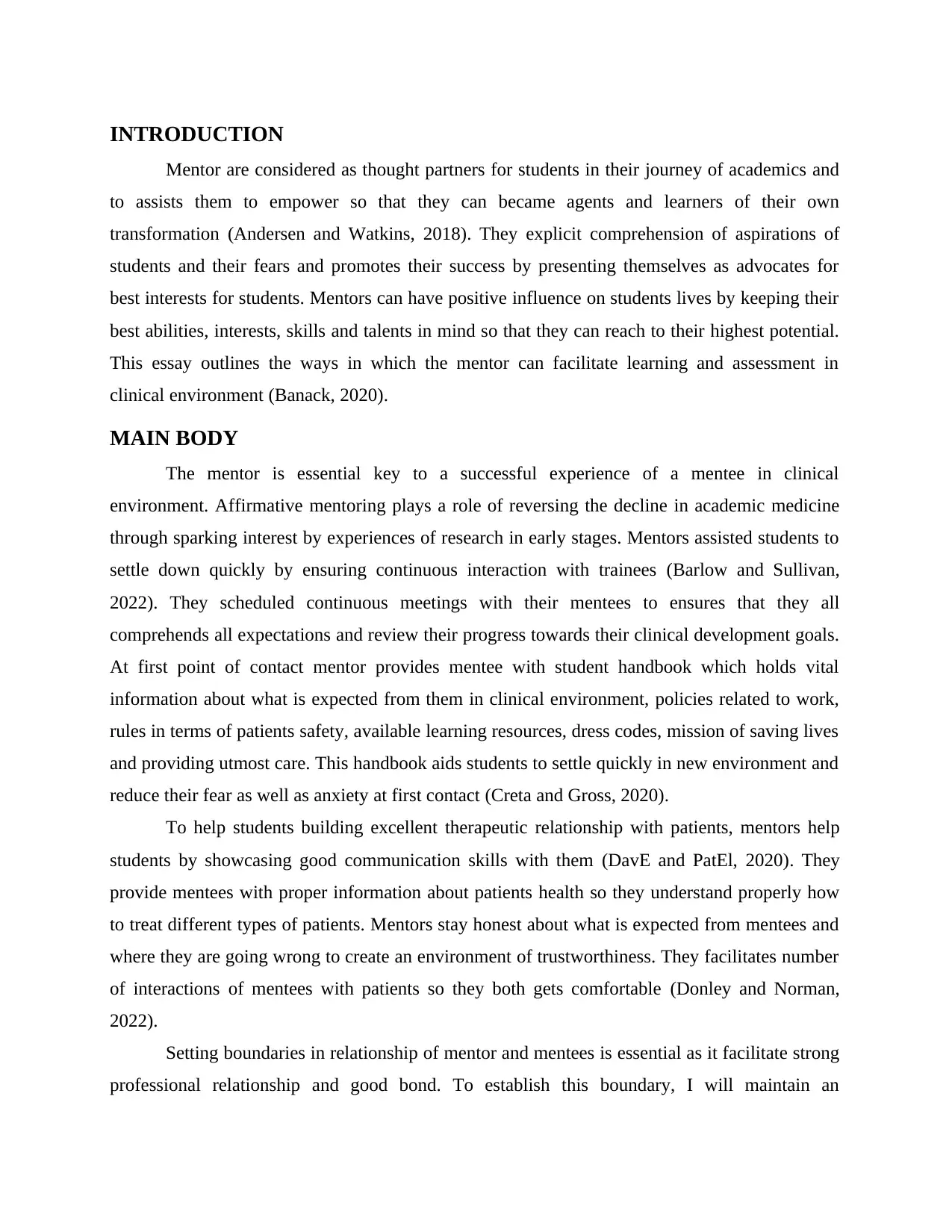
INTRODUCTION
Mentor are considered as thought partners for students in their journey of academics and
to assists them to empower so that they can became agents and learners of their own
transformation (Andersen and Watkins, 2018). They explicit comprehension of aspirations of
students and their fears and promotes their success by presenting themselves as advocates for
best interests for students. Mentors can have positive influence on students lives by keeping their
best abilities, interests, skills and talents in mind so that they can reach to their highest potential.
This essay outlines the ways in which the mentor can facilitate learning and assessment in
clinical environment (Banack, 2020).
MAIN BODY
The mentor is essential key to a successful experience of a mentee in clinical
environment. Affirmative mentoring plays a role of reversing the decline in academic medicine
through sparking interest by experiences of research in early stages. Mentors assisted students to
settle down quickly by ensuring continuous interaction with trainees (Barlow and Sullivan,
2022). They scheduled continuous meetings with their mentees to ensures that they all
comprehends all expectations and review their progress towards their clinical development goals.
At first point of contact mentor provides mentee with student handbook which holds vital
information about what is expected from them in clinical environment, policies related to work,
rules in terms of patients safety, available learning resources, dress codes, mission of saving lives
and providing utmost care. This handbook aids students to settle quickly in new environment and
reduce their fear as well as anxiety at first contact (Creta and Gross, 2020).
To help students building excellent therapeutic relationship with patients, mentors help
students by showcasing good communication skills with them (DavE and PatEl, 2020). They
provide mentees with proper information about patients health so they understand properly how
to treat different types of patients. Mentors stay honest about what is expected from mentees and
where they are going wrong to create an environment of trustworthiness. They facilitates number
of interactions of mentees with patients so they both gets comfortable (Donley and Norman,
2022).
Setting boundaries in relationship of mentor and mentees is essential as it facilitate strong
professional relationship and good bond. To establish this boundary, I will maintain an
Mentor are considered as thought partners for students in their journey of academics and
to assists them to empower so that they can became agents and learners of their own
transformation (Andersen and Watkins, 2018). They explicit comprehension of aspirations of
students and their fears and promotes their success by presenting themselves as advocates for
best interests for students. Mentors can have positive influence on students lives by keeping their
best abilities, interests, skills and talents in mind so that they can reach to their highest potential.
This essay outlines the ways in which the mentor can facilitate learning and assessment in
clinical environment (Banack, 2020).
MAIN BODY
The mentor is essential key to a successful experience of a mentee in clinical
environment. Affirmative mentoring plays a role of reversing the decline in academic medicine
through sparking interest by experiences of research in early stages. Mentors assisted students to
settle down quickly by ensuring continuous interaction with trainees (Barlow and Sullivan,
2022). They scheduled continuous meetings with their mentees to ensures that they all
comprehends all expectations and review their progress towards their clinical development goals.
At first point of contact mentor provides mentee with student handbook which holds vital
information about what is expected from them in clinical environment, policies related to work,
rules in terms of patients safety, available learning resources, dress codes, mission of saving lives
and providing utmost care. This handbook aids students to settle quickly in new environment and
reduce their fear as well as anxiety at first contact (Creta and Gross, 2020).
To help students building excellent therapeutic relationship with patients, mentors help
students by showcasing good communication skills with them (DavE and PatEl, 2020). They
provide mentees with proper information about patients health so they understand properly how
to treat different types of patients. Mentors stay honest about what is expected from mentees and
where they are going wrong to create an environment of trustworthiness. They facilitates number
of interactions of mentees with patients so they both gets comfortable (Donley and Norman,
2022).
Setting boundaries in relationship of mentor and mentees is essential as it facilitate strong
professional relationship and good bond. To establish this boundary, I will maintain an
⊘ This is a preview!⊘
Do you want full access?
Subscribe today to unlock all pages.

Trusted by 1+ million students worldwide
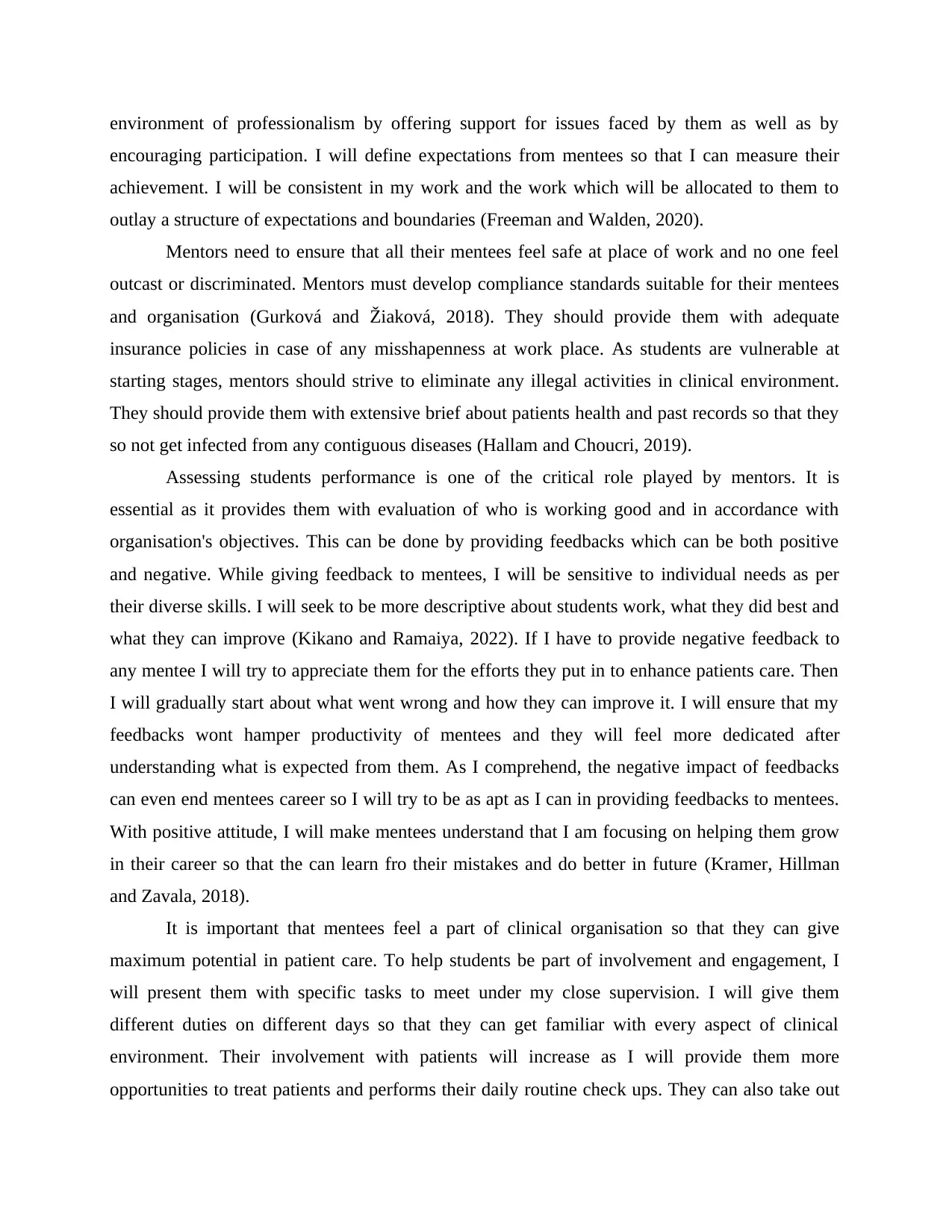
environment of professionalism by offering support for issues faced by them as well as by
encouraging participation. I will define expectations from mentees so that I can measure their
achievement. I will be consistent in my work and the work which will be allocated to them to
outlay a structure of expectations and boundaries (Freeman and Walden, 2020).
Mentors need to ensure that all their mentees feel safe at place of work and no one feel
outcast or discriminated. Mentors must develop compliance standards suitable for their mentees
and organisation (Gurková and Žiaková, 2018). They should provide them with adequate
insurance policies in case of any misshapenness at work place. As students are vulnerable at
starting stages, mentors should strive to eliminate any illegal activities in clinical environment.
They should provide them with extensive brief about patients health and past records so that they
so not get infected from any contiguous diseases (Hallam and Choucri, 2019).
Assessing students performance is one of the critical role played by mentors. It is
essential as it provides them with evaluation of who is working good and in accordance with
organisation's objectives. This can be done by providing feedbacks which can be both positive
and negative. While giving feedback to mentees, I will be sensitive to individual needs as per
their diverse skills. I will seek to be more descriptive about students work, what they did best and
what they can improve (Kikano and Ramaiya, 2022). If I have to provide negative feedback to
any mentee I will try to appreciate them for the efforts they put in to enhance patients care. Then
I will gradually start about what went wrong and how they can improve it. I will ensure that my
feedbacks wont hamper productivity of mentees and they will feel more dedicated after
understanding what is expected from them. As I comprehend, the negative impact of feedbacks
can even end mentees career so I will try to be as apt as I can in providing feedbacks to mentees.
With positive attitude, I will make mentees understand that I am focusing on helping them grow
in their career so that the can learn fro their mistakes and do better in future (Kramer, Hillman
and Zavala, 2018).
It is important that mentees feel a part of clinical organisation so that they can give
maximum potential in patient care. To help students be part of involvement and engagement, I
will present them with specific tasks to meet under my close supervision. I will give them
different duties on different days so that they can get familiar with every aspect of clinical
environment. Their involvement with patients will increase as I will provide them more
opportunities to treat patients and performs their daily routine check ups. They can also take out
encouraging participation. I will define expectations from mentees so that I can measure their
achievement. I will be consistent in my work and the work which will be allocated to them to
outlay a structure of expectations and boundaries (Freeman and Walden, 2020).
Mentors need to ensure that all their mentees feel safe at place of work and no one feel
outcast or discriminated. Mentors must develop compliance standards suitable for their mentees
and organisation (Gurková and Žiaková, 2018). They should provide them with adequate
insurance policies in case of any misshapenness at work place. As students are vulnerable at
starting stages, mentors should strive to eliminate any illegal activities in clinical environment.
They should provide them with extensive brief about patients health and past records so that they
so not get infected from any contiguous diseases (Hallam and Choucri, 2019).
Assessing students performance is one of the critical role played by mentors. It is
essential as it provides them with evaluation of who is working good and in accordance with
organisation's objectives. This can be done by providing feedbacks which can be both positive
and negative. While giving feedback to mentees, I will be sensitive to individual needs as per
their diverse skills. I will seek to be more descriptive about students work, what they did best and
what they can improve (Kikano and Ramaiya, 2022). If I have to provide negative feedback to
any mentee I will try to appreciate them for the efforts they put in to enhance patients care. Then
I will gradually start about what went wrong and how they can improve it. I will ensure that my
feedbacks wont hamper productivity of mentees and they will feel more dedicated after
understanding what is expected from them. As I comprehend, the negative impact of feedbacks
can even end mentees career so I will try to be as apt as I can in providing feedbacks to mentees.
With positive attitude, I will make mentees understand that I am focusing on helping them grow
in their career so that the can learn fro their mistakes and do better in future (Kramer, Hillman
and Zavala, 2018).
It is important that mentees feel a part of clinical organisation so that they can give
maximum potential in patient care. To help students be part of involvement and engagement, I
will present them with specific tasks to meet under my close supervision. I will give them
different duties on different days so that they can get familiar with every aspect of clinical
environment. Their involvement with patients will increase as I will provide them more
opportunities to treat patients and performs their daily routine check ups. They can also take out
Paraphrase This Document
Need a fresh take? Get an instant paraphrase of this document with our AI Paraphraser
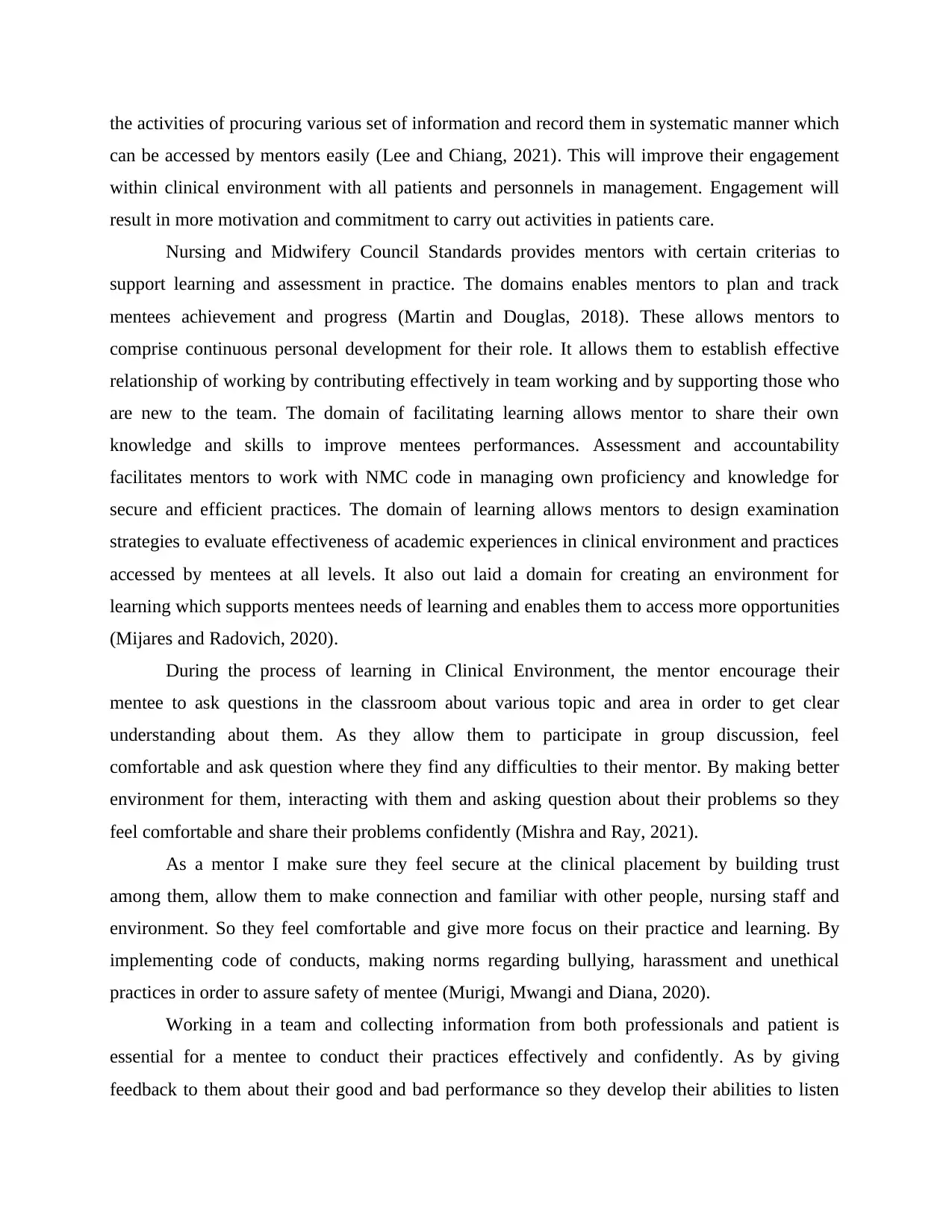
the activities of procuring various set of information and record them in systematic manner which
can be accessed by mentors easily (Lee and Chiang, 2021). This will improve their engagement
within clinical environment with all patients and personnels in management. Engagement will
result in more motivation and commitment to carry out activities in patients care.
Nursing and Midwifery Council Standards provides mentors with certain criterias to
support learning and assessment in practice. The domains enables mentors to plan and track
mentees achievement and progress (Martin and Douglas, 2018). These allows mentors to
comprise continuous personal development for their role. It allows them to establish effective
relationship of working by contributing effectively in team working and by supporting those who
are new to the team. The domain of facilitating learning allows mentor to share their own
knowledge and skills to improve mentees performances. Assessment and accountability
facilitates mentors to work with NMC code in managing own proficiency and knowledge for
secure and efficient practices. The domain of learning allows mentors to design examination
strategies to evaluate effectiveness of academic experiences in clinical environment and practices
accessed by mentees at all levels. It also out laid a domain for creating an environment for
learning which supports mentees needs of learning and enables them to access more opportunities
(Mijares and Radovich, 2020).
During the process of learning in Clinical Environment, the mentor encourage their
mentee to ask questions in the classroom about various topic and area in order to get clear
understanding about them. As they allow them to participate in group discussion, feel
comfortable and ask question where they find any difficulties to their mentor. By making better
environment for them, interacting with them and asking question about their problems so they
feel comfortable and share their problems confidently (Mishra and Ray, 2021).
As a mentor I make sure they feel secure at the clinical placement by building trust
among them, allow them to make connection and familiar with other people, nursing staff and
environment. So they feel comfortable and give more focus on their practice and learning. By
implementing code of conducts, making norms regarding bullying, harassment and unethical
practices in order to assure safety of mentee (Murigi, Mwangi and Diana, 2020).
Working in a team and collecting information from both professionals and patient is
essential for a mentee to conduct their practices effectively and confidently. As by giving
feedback to them about their good and bad performance so they develop their abilities to listen
can be accessed by mentors easily (Lee and Chiang, 2021). This will improve their engagement
within clinical environment with all patients and personnels in management. Engagement will
result in more motivation and commitment to carry out activities in patients care.
Nursing and Midwifery Council Standards provides mentors with certain criterias to
support learning and assessment in practice. The domains enables mentors to plan and track
mentees achievement and progress (Martin and Douglas, 2018). These allows mentors to
comprise continuous personal development for their role. It allows them to establish effective
relationship of working by contributing effectively in team working and by supporting those who
are new to the team. The domain of facilitating learning allows mentor to share their own
knowledge and skills to improve mentees performances. Assessment and accountability
facilitates mentors to work with NMC code in managing own proficiency and knowledge for
secure and efficient practices. The domain of learning allows mentors to design examination
strategies to evaluate effectiveness of academic experiences in clinical environment and practices
accessed by mentees at all levels. It also out laid a domain for creating an environment for
learning which supports mentees needs of learning and enables them to access more opportunities
(Mijares and Radovich, 2020).
During the process of learning in Clinical Environment, the mentor encourage their
mentee to ask questions in the classroom about various topic and area in order to get clear
understanding about them. As they allow them to participate in group discussion, feel
comfortable and ask question where they find any difficulties to their mentor. By making better
environment for them, interacting with them and asking question about their problems so they
feel comfortable and share their problems confidently (Mishra and Ray, 2021).
As a mentor I make sure they feel secure at the clinical placement by building trust
among them, allow them to make connection and familiar with other people, nursing staff and
environment. So they feel comfortable and give more focus on their practice and learning. By
implementing code of conducts, making norms regarding bullying, harassment and unethical
practices in order to assure safety of mentee (Murigi, Mwangi and Diana, 2020).
Working in a team and collecting information from both professionals and patient is
essential for a mentee to conduct their practices effectively and confidently. As by giving
feedback to them about their good and bad performance so they develop their abilities to listen
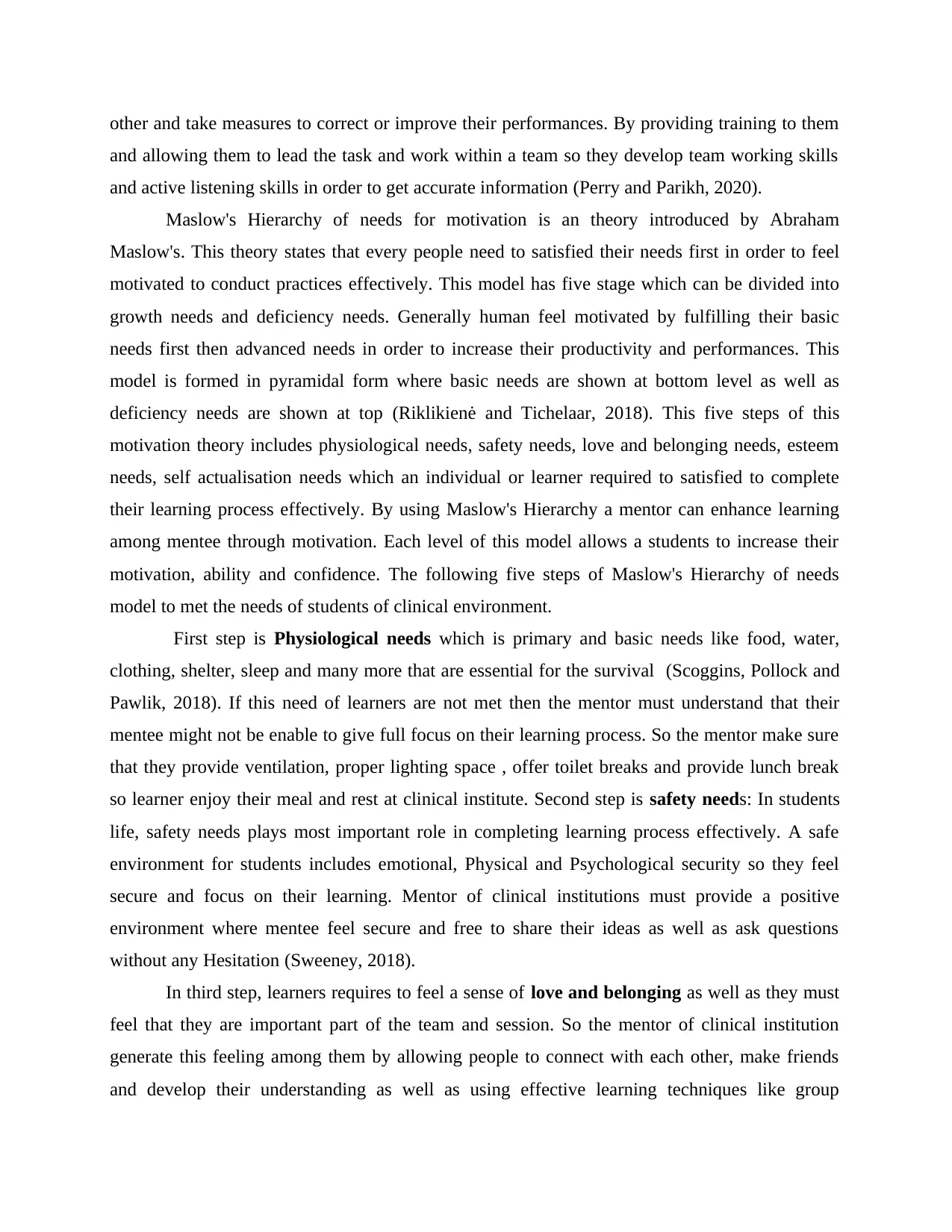
other and take measures to correct or improve their performances. By providing training to them
and allowing them to lead the task and work within a team so they develop team working skills
and active listening skills in order to get accurate information (Perry and Parikh, 2020).
Maslow's Hierarchy of needs for motivation is an theory introduced by Abraham
Maslow's. This theory states that every people need to satisfied their needs first in order to feel
motivated to conduct practices effectively. This model has five stage which can be divided into
growth needs and deficiency needs. Generally human feel motivated by fulfilling their basic
needs first then advanced needs in order to increase their productivity and performances. This
model is formed in pyramidal form where basic needs are shown at bottom level as well as
deficiency needs are shown at top (Riklikienė and Tichelaar, 2018). This five steps of this
motivation theory includes physiological needs, safety needs, love and belonging needs, esteem
needs, self actualisation needs which an individual or learner required to satisfied to complete
their learning process effectively. By using Maslow's Hierarchy a mentor can enhance learning
among mentee through motivation. Each level of this model allows a students to increase their
motivation, ability and confidence. The following five steps of Maslow's Hierarchy of needs
model to met the needs of students of clinical environment.
First step is Physiological needs which is primary and basic needs like food, water,
clothing, shelter, sleep and many more that are essential for the survival (Scoggins, Pollock and
Pawlik, 2018). If this need of learners are not met then the mentor must understand that their
mentee might not be enable to give full focus on their learning process. So the mentor make sure
that they provide ventilation, proper lighting space , offer toilet breaks and provide lunch break
so learner enjoy their meal and rest at clinical institute. Second step is safety needs: In students
life, safety needs plays most important role in completing learning process effectively. A safe
environment for students includes emotional, Physical and Psychological security so they feel
secure and focus on their learning. Mentor of clinical institutions must provide a positive
environment where mentee feel secure and free to share their ideas as well as ask questions
without any Hesitation (Sweeney, 2018).
In third step, learners requires to feel a sense of love and belonging as well as they must
feel that they are important part of the team and session. So the mentor of clinical institution
generate this feeling among them by allowing people to connect with each other, make friends
and develop their understanding as well as using effective learning techniques like group
and allowing them to lead the task and work within a team so they develop team working skills
and active listening skills in order to get accurate information (Perry and Parikh, 2020).
Maslow's Hierarchy of needs for motivation is an theory introduced by Abraham
Maslow's. This theory states that every people need to satisfied their needs first in order to feel
motivated to conduct practices effectively. This model has five stage which can be divided into
growth needs and deficiency needs. Generally human feel motivated by fulfilling their basic
needs first then advanced needs in order to increase their productivity and performances. This
model is formed in pyramidal form where basic needs are shown at bottom level as well as
deficiency needs are shown at top (Riklikienė and Tichelaar, 2018). This five steps of this
motivation theory includes physiological needs, safety needs, love and belonging needs, esteem
needs, self actualisation needs which an individual or learner required to satisfied to complete
their learning process effectively. By using Maslow's Hierarchy a mentor can enhance learning
among mentee through motivation. Each level of this model allows a students to increase their
motivation, ability and confidence. The following five steps of Maslow's Hierarchy of needs
model to met the needs of students of clinical environment.
First step is Physiological needs which is primary and basic needs like food, water,
clothing, shelter, sleep and many more that are essential for the survival (Scoggins, Pollock and
Pawlik, 2018). If this need of learners are not met then the mentor must understand that their
mentee might not be enable to give full focus on their learning process. So the mentor make sure
that they provide ventilation, proper lighting space , offer toilet breaks and provide lunch break
so learner enjoy their meal and rest at clinical institute. Second step is safety needs: In students
life, safety needs plays most important role in completing learning process effectively. A safe
environment for students includes emotional, Physical and Psychological security so they feel
secure and focus on their learning. Mentor of clinical institutions must provide a positive
environment where mentee feel secure and free to share their ideas as well as ask questions
without any Hesitation (Sweeney, 2018).
In third step, learners requires to feel a sense of love and belonging as well as they must
feel that they are important part of the team and session. So the mentor of clinical institution
generate this feeling among them by allowing people to connect with each other, make friends
and develop their understanding as well as using effective learning techniques like group
⊘ This is a preview!⊘
Do you want full access?
Subscribe today to unlock all pages.

Trusted by 1+ million students worldwide
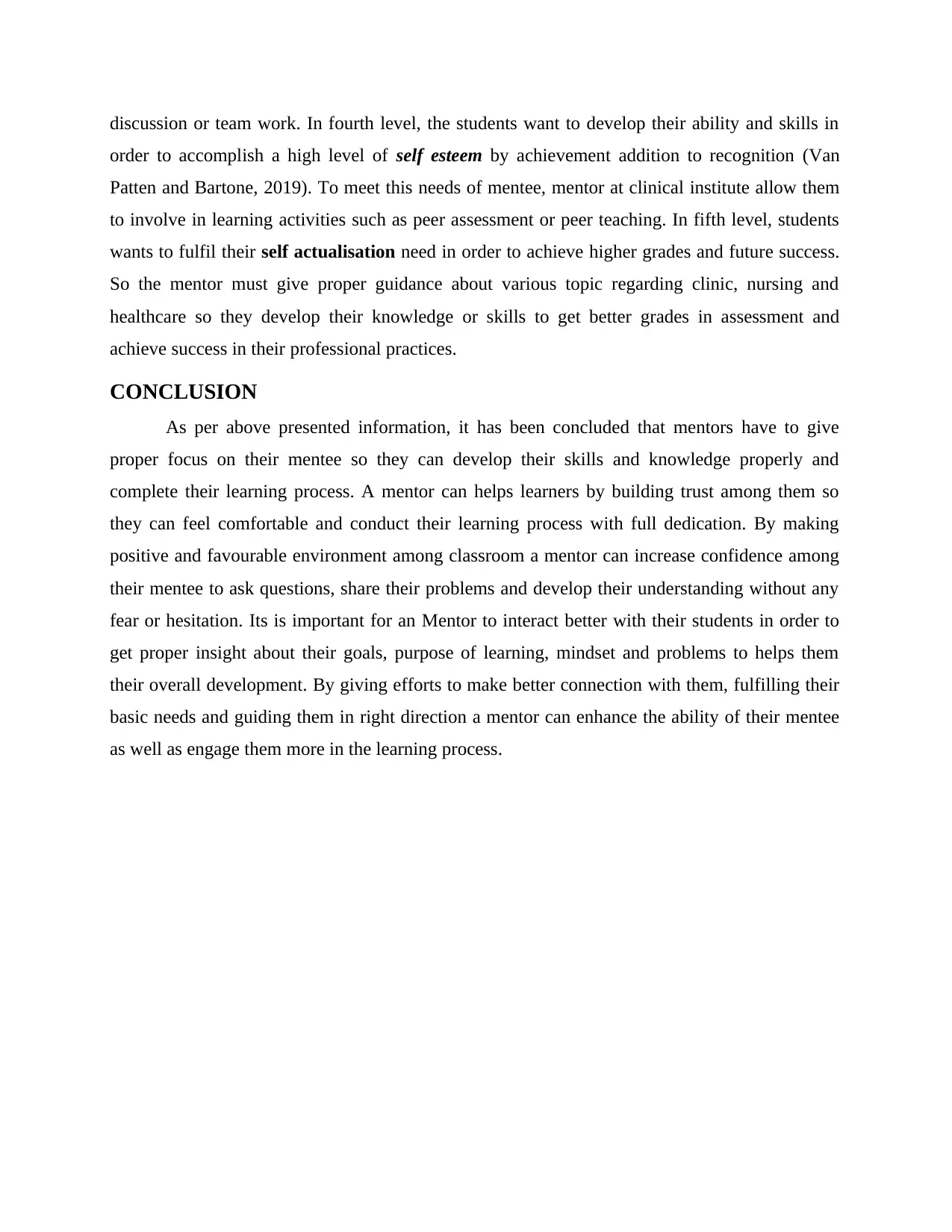
discussion or team work. In fourth level, the students want to develop their ability and skills in
order to accomplish a high level of self esteem by achievement addition to recognition (Van
Patten and Bartone, 2019). To meet this needs of mentee, mentor at clinical institute allow them
to involve in learning activities such as peer assessment or peer teaching. In fifth level, students
wants to fulfil their self actualisation need in order to achieve higher grades and future success.
So the mentor must give proper guidance about various topic regarding clinic, nursing and
healthcare so they develop their knowledge or skills to get better grades in assessment and
achieve success in their professional practices.
CONCLUSION
As per above presented information, it has been concluded that mentors have to give
proper focus on their mentee so they can develop their skills and knowledge properly and
complete their learning process. A mentor can helps learners by building trust among them so
they can feel comfortable and conduct their learning process with full dedication. By making
positive and favourable environment among classroom a mentor can increase confidence among
their mentee to ask questions, share their problems and develop their understanding without any
fear or hesitation. Its is important for an Mentor to interact better with their students in order to
get proper insight about their goals, purpose of learning, mindset and problems to helps them
their overall development. By giving efforts to make better connection with them, fulfilling their
basic needs and guiding them in right direction a mentor can enhance the ability of their mentee
as well as engage them more in the learning process.
order to accomplish a high level of self esteem by achievement addition to recognition (Van
Patten and Bartone, 2019). To meet this needs of mentee, mentor at clinical institute allow them
to involve in learning activities such as peer assessment or peer teaching. In fifth level, students
wants to fulfil their self actualisation need in order to achieve higher grades and future success.
So the mentor must give proper guidance about various topic regarding clinic, nursing and
healthcare so they develop their knowledge or skills to get better grades in assessment and
achieve success in their professional practices.
CONCLUSION
As per above presented information, it has been concluded that mentors have to give
proper focus on their mentee so they can develop their skills and knowledge properly and
complete their learning process. A mentor can helps learners by building trust among them so
they can feel comfortable and conduct their learning process with full dedication. By making
positive and favourable environment among classroom a mentor can increase confidence among
their mentee to ask questions, share their problems and develop their understanding without any
fear or hesitation. Its is important for an Mentor to interact better with their students in order to
get proper insight about their goals, purpose of learning, mindset and problems to helps them
their overall development. By giving efforts to make better connection with them, fulfilling their
basic needs and guiding them in right direction a mentor can enhance the ability of their mentee
as well as engage them more in the learning process.
Paraphrase This Document
Need a fresh take? Get an instant paraphrase of this document with our AI Paraphraser
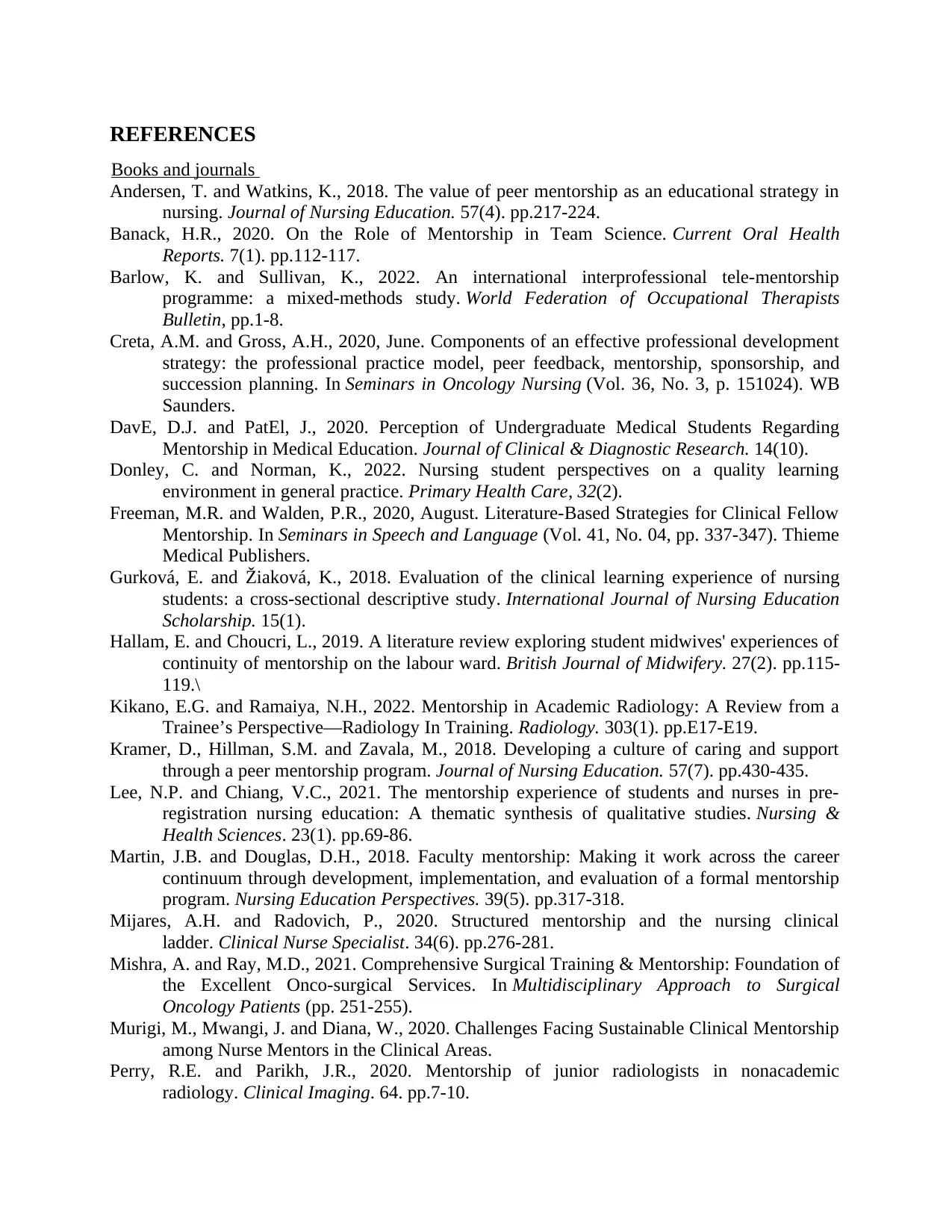
REFERENCES
Books and journals
Andersen, T. and Watkins, K., 2018. The value of peer mentorship as an educational strategy in
nursing. Journal of Nursing Education. 57(4). pp.217-224.
Banack, H.R., 2020. On the Role of Mentorship in Team Science. Current Oral Health
Reports. 7(1). pp.112-117.
Barlow, K. and Sullivan, K., 2022. An international interprofessional tele-mentorship
programme: a mixed-methods study. World Federation of Occupational Therapists
Bulletin, pp.1-8.
Creta, A.M. and Gross, A.H., 2020, June. Components of an effective professional development
strategy: the professional practice model, peer feedback, mentorship, sponsorship, and
succession planning. In Seminars in Oncology Nursing (Vol. 36, No. 3, p. 151024). WB
Saunders.
DavE, D.J. and PatEl, J., 2020. Perception of Undergraduate Medical Students Regarding
Mentorship in Medical Education. Journal of Clinical & Diagnostic Research. 14(10).
Donley, C. and Norman, K., 2022. Nursing student perspectives on a quality learning
environment in general practice. Primary Health Care, 32(2).
Freeman, M.R. and Walden, P.R., 2020, August. Literature-Based Strategies for Clinical Fellow
Mentorship. In Seminars in Speech and Language (Vol. 41, No. 04, pp. 337-347). Thieme
Medical Publishers.
Gurková, E. and Žiaková, K., 2018. Evaluation of the clinical learning experience of nursing
students: a cross-sectional descriptive study. International Journal of Nursing Education
Scholarship. 15(1).
Hallam, E. and Choucri, L., 2019. A literature review exploring student midwives' experiences of
continuity of mentorship on the labour ward. British Journal of Midwifery. 27(2). pp.115-
119.\
Kikano, E.G. and Ramaiya, N.H., 2022. Mentorship in Academic Radiology: A Review from a
Trainee’s Perspective—Radiology In Training. Radiology. 303(1). pp.E17-E19.
Kramer, D., Hillman, S.M. and Zavala, M., 2018. Developing a culture of caring and support
through a peer mentorship program. Journal of Nursing Education. 57(7). pp.430-435.
Lee, N.P. and Chiang, V.C., 2021. The mentorship experience of students and nurses in pre‐
registration nursing education: A thematic synthesis of qualitative studies. Nursing &
Health Sciences. 23(1). pp.69-86.
Martin, J.B. and Douglas, D.H., 2018. Faculty mentorship: Making it work across the career
continuum through development, implementation, and evaluation of a formal mentorship
program. Nursing Education Perspectives. 39(5). pp.317-318.
Mijares, A.H. and Radovich, P., 2020. Structured mentorship and the nursing clinical
ladder. Clinical Nurse Specialist. 34(6). pp.276-281.
Mishra, A. and Ray, M.D., 2021. Comprehensive Surgical Training & Mentorship: Foundation of
the Excellent Onco-surgical Services. In Multidisciplinary Approach to Surgical
Oncology Patients (pp. 251-255).
Murigi, M., Mwangi, J. and Diana, W., 2020. Challenges Facing Sustainable Clinical Mentorship
among Nurse Mentors in the Clinical Areas.
Perry, R.E. and Parikh, J.R., 2020. Mentorship of junior radiologists in nonacademic
radiology. Clinical Imaging. 64. pp.7-10.
Books and journals
Andersen, T. and Watkins, K., 2018. The value of peer mentorship as an educational strategy in
nursing. Journal of Nursing Education. 57(4). pp.217-224.
Banack, H.R., 2020. On the Role of Mentorship in Team Science. Current Oral Health
Reports. 7(1). pp.112-117.
Barlow, K. and Sullivan, K., 2022. An international interprofessional tele-mentorship
programme: a mixed-methods study. World Federation of Occupational Therapists
Bulletin, pp.1-8.
Creta, A.M. and Gross, A.H., 2020, June. Components of an effective professional development
strategy: the professional practice model, peer feedback, mentorship, sponsorship, and
succession planning. In Seminars in Oncology Nursing (Vol. 36, No. 3, p. 151024). WB
Saunders.
DavE, D.J. and PatEl, J., 2020. Perception of Undergraduate Medical Students Regarding
Mentorship in Medical Education. Journal of Clinical & Diagnostic Research. 14(10).
Donley, C. and Norman, K., 2022. Nursing student perspectives on a quality learning
environment in general practice. Primary Health Care, 32(2).
Freeman, M.R. and Walden, P.R., 2020, August. Literature-Based Strategies for Clinical Fellow
Mentorship. In Seminars in Speech and Language (Vol. 41, No. 04, pp. 337-347). Thieme
Medical Publishers.
Gurková, E. and Žiaková, K., 2018. Evaluation of the clinical learning experience of nursing
students: a cross-sectional descriptive study. International Journal of Nursing Education
Scholarship. 15(1).
Hallam, E. and Choucri, L., 2019. A literature review exploring student midwives' experiences of
continuity of mentorship on the labour ward. British Journal of Midwifery. 27(2). pp.115-
119.\
Kikano, E.G. and Ramaiya, N.H., 2022. Mentorship in Academic Radiology: A Review from a
Trainee’s Perspective—Radiology In Training. Radiology. 303(1). pp.E17-E19.
Kramer, D., Hillman, S.M. and Zavala, M., 2018. Developing a culture of caring and support
through a peer mentorship program. Journal of Nursing Education. 57(7). pp.430-435.
Lee, N.P. and Chiang, V.C., 2021. The mentorship experience of students and nurses in pre‐
registration nursing education: A thematic synthesis of qualitative studies. Nursing &
Health Sciences. 23(1). pp.69-86.
Martin, J.B. and Douglas, D.H., 2018. Faculty mentorship: Making it work across the career
continuum through development, implementation, and evaluation of a formal mentorship
program. Nursing Education Perspectives. 39(5). pp.317-318.
Mijares, A.H. and Radovich, P., 2020. Structured mentorship and the nursing clinical
ladder. Clinical Nurse Specialist. 34(6). pp.276-281.
Mishra, A. and Ray, M.D., 2021. Comprehensive Surgical Training & Mentorship: Foundation of
the Excellent Onco-surgical Services. In Multidisciplinary Approach to Surgical
Oncology Patients (pp. 251-255).
Murigi, M., Mwangi, J. and Diana, W., 2020. Challenges Facing Sustainable Clinical Mentorship
among Nurse Mentors in the Clinical Areas.
Perry, R.E. and Parikh, J.R., 2020. Mentorship of junior radiologists in nonacademic
radiology. Clinical Imaging. 64. pp.7-10.
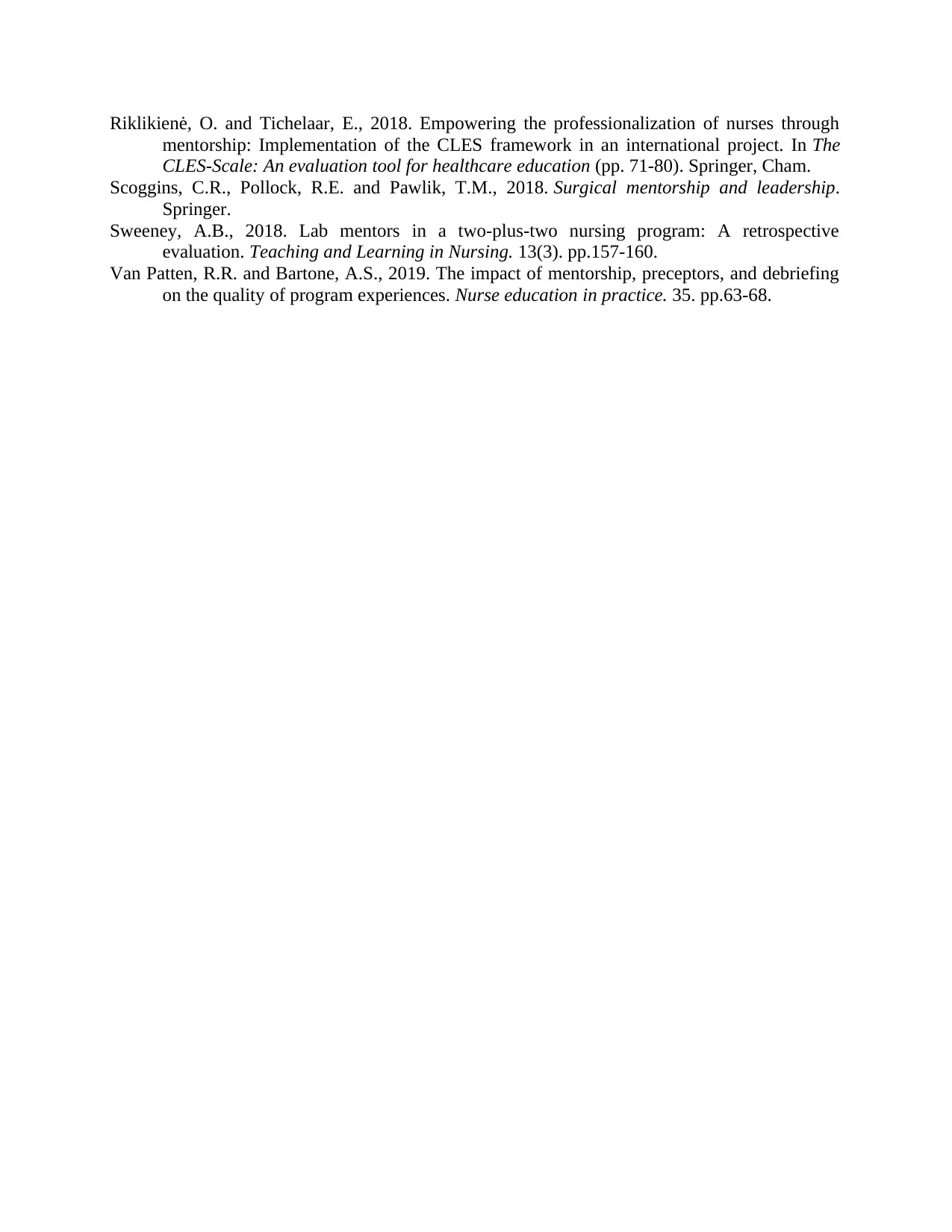
Riklikienė, O. and Tichelaar, E., 2018. Empowering the professionalization of nurses through
mentorship: Implementation of the CLES framework in an international project. In The
CLES-Scale: An evaluation tool for healthcare education (pp. 71-80). Springer, Cham.
Scoggins, C.R., Pollock, R.E. and Pawlik, T.M., 2018. Surgical mentorship and leadership.
Springer.
Sweeney, A.B., 2018. Lab mentors in a two-plus-two nursing program: A retrospective
evaluation. Teaching and Learning in Nursing. 13(3). pp.157-160.
Van Patten, R.R. and Bartone, A.S., 2019. The impact of mentorship, preceptors, and debriefing
on the quality of program experiences. Nurse education in practice. 35. pp.63-68.
mentorship: Implementation of the CLES framework in an international project. In The
CLES-Scale: An evaluation tool for healthcare education (pp. 71-80). Springer, Cham.
Scoggins, C.R., Pollock, R.E. and Pawlik, T.M., 2018. Surgical mentorship and leadership.
Springer.
Sweeney, A.B., 2018. Lab mentors in a two-plus-two nursing program: A retrospective
evaluation. Teaching and Learning in Nursing. 13(3). pp.157-160.
Van Patten, R.R. and Bartone, A.S., 2019. The impact of mentorship, preceptors, and debriefing
on the quality of program experiences. Nurse education in practice. 35. pp.63-68.
⊘ This is a preview!⊘
Do you want full access?
Subscribe today to unlock all pages.

Trusted by 1+ million students worldwide
1 out of 9
Related Documents
Your All-in-One AI-Powered Toolkit for Academic Success.
+13062052269
info@desklib.com
Available 24*7 on WhatsApp / Email
![[object Object]](/_next/static/media/star-bottom.7253800d.svg)
Unlock your academic potential
Copyright © 2020–2026 A2Z Services. All Rights Reserved. Developed and managed by ZUCOL.




